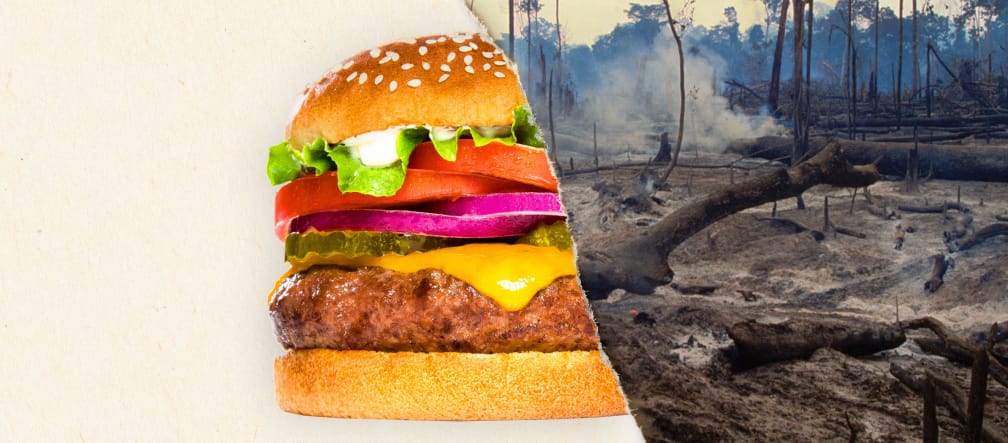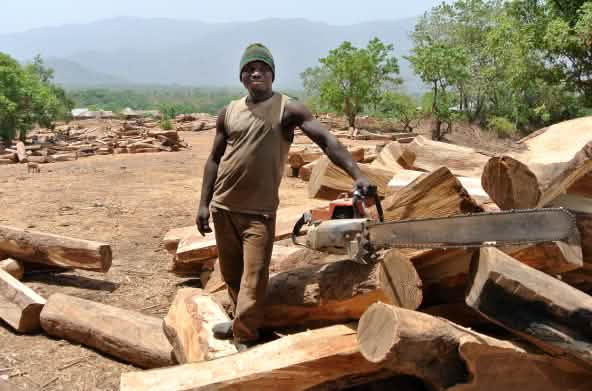
Completed campaign
Tell Burger King and Cargill to stop deforestation!
Burger King refuses to answer questions about its suppliers despite overwhelming evidence that the cattle for its beef are fed with soy stemming from forest destruction. Tell the fast-food giant to get deforestation out of its supply chain and to protect the habitat of jaguars and monkeys.
To: CEO Daniel Schwartz and the management of Burger King
“Burger King’s suppliers clear forests for industrial soy farms and feedlots in South America. Get deforestation out of your supply chain NOW.”Sloths dangle from limbs, jaguars slink along the forest floor, monkeys cavort in the treetops – South America’s forests and savannahs are bursting with life. Yet fast-food chains such as Burger King are destroying these diverse habitats.
“South America’s forests are ‘ground zero’ for beef-driven deforestation,” notes the Union of Concerned Scientists. In their study “Cattle, Cleared Forests, and Climate Change”, they document just how little food industry giants care about the environment. On the organization’s scorecard of major beef sellers’ deforestation profiles, Burger King scored zero of a possible 100 points.
A report and satellite images published by the NGO Mighty Earth documents Burger King’s practices in South America: the fast-food giant buys soy for animal feed from producers who clear forests and savanna for their industrial agriculture operations. Burger King accepts that one of its most important suppliers, Cargill, intends to continue destroying forest for soy farms until 2030 – a further thirteen years in which bulldozers will be wiping out the habitat of sloths, jaguars and monkeys.
The beef that goes into the company’s Whoppers in Germany, for example, is sourced entirely within Germany and neighboring Austria. However, Burger King refuses to answer detailed questions about the sources of the feed. From a global perspective, Burger King’s purchasing policy is a disaster for nature.
Please tell Burger King to get environmental destruction out of its supply chain now.
While this petition is addressed to Burger King, the fast-food giant is typical for other companies in the industry that show equally little regard for forests and wildlife. The rainforests and millions of animals would benefit the most if more people were to choose a vegan or vegetarian diet.
Burger King is the second largest fast-food chain in the world. The group has a total of 15,000 restaurants in more than 100 countries.
Burger King’s parent company Restaurant Brands International is owned by 3G Capital, which in turn controls the Tim Horton’s coffee chain, Kraft, Heinz, InBev and Anheuser-Busch.
The agricultural giants Cargill and Bunge are two of Burger King’s most important suppliers.
According to Burger King, 80 percent of the beef used in its German restaurants is sourced domestically, while the remaining 20 percent comes from Austria. Burger King did not reply to our detailed questions about whether the animals are reared with feed from Cargill or Bunge.
In Brazil's Cerrado, 50,000 hectares of forest were destroyed in regions in which Bunge operates; between 2011 and 2015, no less than 567,562 hectares were lost. In areas in which Cargill is active, 130,000 hectares were deforested within those five years.
A soy moratorium in the Brazilian Amazon is often praised as a model to stop deforestation. On closer inspection, however, it becomes apparent that the moratorium is merely clever PR and greenwashing. Once it entered into force, the destruction of rainforests declined – but it exploded in the Cerrado.
Burger King’s reaction
Burger King Germany responded to Rainforest Rescue’s detailed questions with general references to certificates. We regard the key statement to be “Please understand that we cannot provide any further detailed information or breakdowns.”
Burger King in the media
Media around the world have been exposing Burger King’s responsibility for rainforest destruction. Here is a selection of links:
The Guardian: Burger King animal feed sourced from deforested lands in Brazil and Bolivia
Edie.net: Burger King linked to alleged South American deforestation practices
TriplePundit: Burger King Accused of Causing Deforestation Across Latin America
My Green Pod: The Ultimate Mystery Meat
Woodworking Network: Rainforest being burned for farming at faster pace
VegNews: Burger King's Impact on Deforestation Exposed
Plant Based News: Burger King's Damning Environmental Impact Exposed
To: CEO Daniel Schwartz and the management of Burger King
Dear Mr. Schwartz,
Ladies and Gentlemen,
Tropical forests and savannahs are the habitats of an incredible variety of plant and animal species such as sloths, jaguars and monkeys. Burger King endangers this habitat by purchasing beef from suppliers who destroy rainforests for their fields and pastures.
The supply chain of Cargill, a major Burger King supplier, extends deep into tropical and subtropical forests such as the Cerrado. While Cargill has pledged to stop purchasing raw materials from suppliers that destroy forests, its commitment is completely toothless, as Cargill does not plan to implement it until 2030.
In other words, bulldozers will continue destroying the habitat of countless plant and animal species for another thirteen years. We cannot wait that long!
Please get deforestation out of your supply chain without delay.
Kind regards,
The issue – our appetite for meat
Most people in rich countries consider meat to be essential to a good meal. That holds especially true for Americans, who each consumed 90 kilograms of meat in 2014 – in the same year, the global average was 34 kilograms. There are 19 billion chickens, 1.4 billion cows, 1 billion pigs and 1 billion sheep on the planet at any given time – that’s three head of livestock for every person.
Maintaining such a huge livestock population has a very high price: 26 percent of the world’s ice-free land is used for livestock grazing and 33 percent of the world’s cropland is dedicated to growing livestock feed. Instead of feeding humans, a significant share of the world’s wheat, corn, barley and soybeans is thus used to raise livestock. Soybean meal is the largest source of protein animal feed in the world, and the areas needed for its production are expanding into fragile ecosystems such as the Brazilian Cerrado and the Amazon.
The impact – deforestation, monocultures, climate change
Landscapes once covered by rainforest and savannah are now marked by endless industrial agriculture spaces. More than 75 million hectares are devoted to growing soy – an area three times the size of the United Kingdom. Indigenous people are frequently displaced when their forests are bulldozed or torched, and those that remain are often in grave danger due to pesticide exposure: Roundup-Ready Monsanto GMO soybean plants are grown on 31 to 38 percent of the total planted area in Brazil, Argentina, Paraguay and Uruguay. The active ingredient in Roundup is glyphosate, an herbicide that is suspected of causing cancer and damaging human DNA.
Producing meat has a profound impact on the climate: with methane from bovine stomachs, carbon released by deforestation and fossil-fueled machinery, and nitrous oxide released by synthetic fertilizer, animal agriculture accounts for 18 percent of the world’s greenhouse gas emissions.
The solution – plant power and planned indulgences
Our food choices have a direct impact on the future of the rainforests: the animal products we eat account for 72 percent of all food-related greenhouse gas emissions. Their production also requires many times more farmland than plant products for human consumption.
Here is how you can help protect your health, the environment and the climate:
- Eat alternatives to meat and dairy products: Seitan steaks, lupin spreads, soy milk and other tasty and nutritious alternatives to animal products can be found in virtually any supermarket.
- If you must eat meat, make it an occasional treat: If you are not ready to give up meat entirely, reduce your consumption as much as possible and make meat a planned indulgence. Choosing organic meat can help further reduce the environmental impact of your diet.
- Say yes to soy products: Only about two percent of the world's soy crop is processed into tofu, soy yogurt and similar products. Soy for human consumption is mostly grown in Europe and does not drive deforestation.
- Stop food waste: Consumers in North America and Europe each waste between 95 and 110 kg of food a year – much of it meat. Planning your grocery shopping with care can literally save lives.
- Speak out: Tens of thousands have taken part in street protests such as the March Against Monsanto to pressure policymakers and advocate forms of agriculture that take human health, animal welfare and climate protection into account. Taking part in online petitions and writing to your elected representatives can also make a real difference.

